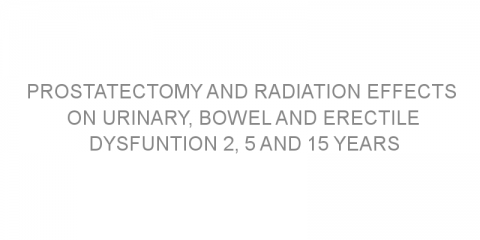In a nutshell The present review evaluated the efficacy, safety and complications of salvage radical prostatectomy in patients with locally recurrent prostate cancer, and sought for the ideal candidates for this procedure. Some background Prostate cancer (PCa) is the most common type of cancer in men. Treatment options for PCa which is confined to...
Read MoreTreatment(s) now being considered-Radical prostatectomy Posts on Medivizor
Rising PSA levels after radiation treatment can predict prostate cancer mortality
In a nutshell This article evaluated whether the interval to biochemical failure (IBF) can be used as a prediction factor for prostate cancer mortality. The IBF was found to be the best current predictor of prostate cancer mortality in patients previously treated with radiation therapy. Some background Biochemical failure is defined...
Read MoreFocal Ultrasound-based therapy for prostate cancer as means to reduced genito-urinary side effects
In a nutshell This study evaluated whether focal Ultrasound-based therapy of individual cancer lesions can minimize the side effects associated with radical therapy that involves the whole prostate gland. Main findings: Focused therapy directed into cancer tissues significantly reduces genitourinary side effects like urine-leakage and impotence. Some...
Read MoreComparing the safety of three different radiotherapy regimens: a clinical trial
In a nutshell This study evaluated the safety of two regimens of external beam radiation – short, high-dose radiotherapy – compared with the standard radiotherapy protocol. There were no substantial differences in side effects between the conventional and experimental radiotherapy regimens. Some background Prostate cancer which...
Read MoreIs radical prostatectomy better than active surveillance in patients with confined prostate cancer?
This article compared the survival effect of two therapeutic approaches for patients with confined prostate cancer: radical prostatectomy (complete removal of the prostate) and active surveillance. Early radical prostatectomy (RP) was found to reduce the number of cancer-related deaths, particularly in patients with high risk prostate...
Read MoreSexual, urinary, hormonal and bowel function – a comparison between prostate cancer survivors and noncancer men
In a nutshell The present study compared survivors of prostate cancer (PC) to patients of similar sexes and ages that have not had prostate cancer (non-cancer controls) based on the effects of prior treatments and treatment options on sexual, urinary, bowel and hormone functions. The main finding was that PC survivors had poorer sexual and urinary...
Read MoreProstatectomy and radiation effects on urinary, bowel and erectile dysfuntion 2, 5 and 15 years after prostate cancer diagnosis
In a nutshell This paper evaluated the long-term influence of prostate cancer treatment with prostatectomy or radiotherapy on urinary, bowel and sexual function. Prostatectomy was associated with a higher rate of urinary and erectile dysfunction, whereas radiotherapy caused more frequent bowel urgency at 2 and 5 years after diagnosis. Some background...
Read MoreRadiation therapy for prostate cancer: how long do urinary-related side effects last?
In a nutshell The present study examined the duration of urinary-related side effects resulting from radiation therapy. Mild to severe urinary side effects were found to last up to 10 years post radiation therapy. Some background Prostate cancer is a slow growing form of cancer that is often managed by active surveillance or observation (delayed...
Read More









